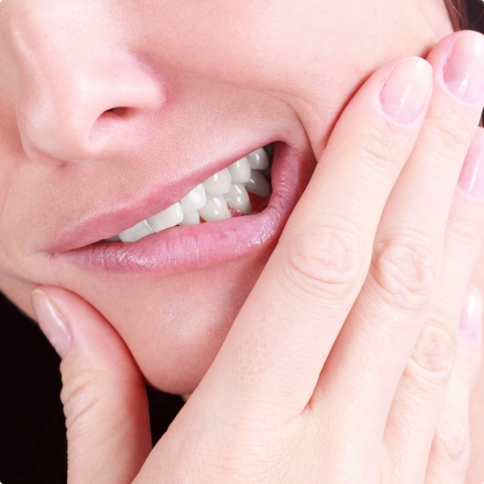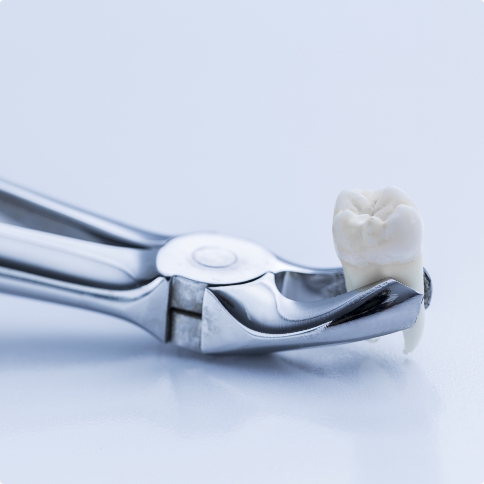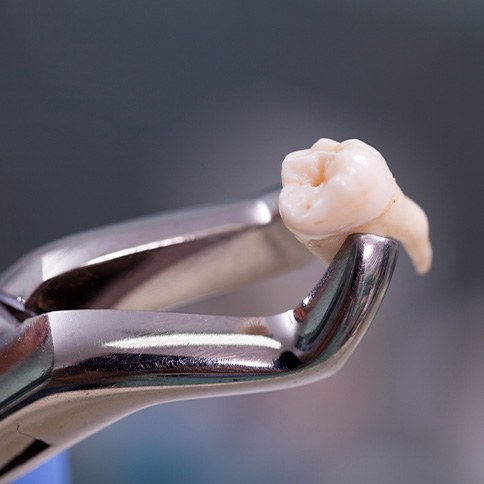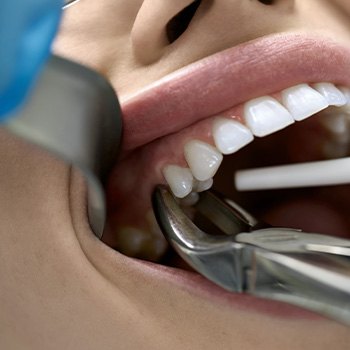Tooth Extractions Weatherford
Keeping Your Smile Healthy for Life
At Cosmetic & Family Dentistry of Weatherford, we are committed to helping our patients achieve and maintain the optimal level of oral health. In most cases, that means partnering with patients to keep their healthy, natural smiles, but for others, tooth extraction is actually in their best interest. If removing one or more teeth is the best option for your smile, we’ll happily offer safe, comfortable tooth extractions at our Weatherford dental office. If you want to learn more about tooth extraction or any of our other dental care solutions, give our knowledgeable dentistry team a call today. We’ll do our utmost to answer your questions over the phone, or one of our team members will schedule an appointment for you to come see us.
Why Choose Cosmetic & Family Dentistry of Weatherford for Tooth Extractions?
- Enhanced Diagnostic Imaging for Accurate Treatment Planning
- Safe & Effective Tooth Replacement Solutions Available
- Knowledgeable Team & Staff Here to Ensure a Positive Experience
When Are Tooth Extractions Necessary?

Our team cares about helping patients maintain the optimal level of oral health, and we always do our utmost to help you keep your natural teeth. However, some of the reasons we may recommend tooth removal include:
- Severe decay or damage
- Primary teeth that don’t fall out on their own
- Impacted teeth that are unable to erupt
- In preparation for orthodontic treatment or tooth replacement
- Wisdom teeth – third molars – are extracted for many different reasons
How Are Teeth Removed?

Teeth are either pulled or surgically extracted. Pulling is only possible when teeth are fully erupted from the gumline. Most teeth require some element of surgical removal whether we simply need to remove some gum tissue to reveal more tooth structure or advanced surgical intervention is necessary.
What Happens After Tooth Extraction?

Before your tooth removal procedure, one of our friendly team members will walk you through best practices in at-home care to ensure you make a quick and complete recovery with minimal discomfort. We will also provide you with direction in writing, so you won’t have to worry about forgetting anything. Below, we’ve included some basic care steps to remember:
- Food – Refrain from using a straw and carbonated drinks as this can form a suction and dislodge the blood clot and slow healing. A soft diet is recommended on the day of the procedure. Take special care to avoid chewing on the side of the surgical wound to help keep food out of the extraction site but also be careful not to bite the cheek that may still be numb for a few hours.
- Hygiene – For the first two days, you will likely experience some bleeding, and you should bite down on gauze to absorb the blood. Make sure to replace the gauze frequently as it becomes saturated. When brushing and flossing the surrounding teeth, be careful to avoid the extraction site.
- Pain – Take over-the-counter and/or prescription pain relievers as directed. You can also use ice packs for the first two days after extraction to relieve pain, slow bleeding, and reduce swelling and inflammation.
- Rest – This one may seem obvious but getting plenty of rest is essential as you heal following tooth removal. Plan to get plenty of sleep and avoid strenuous activities for at least the first few days after treatment.
Understanding the Cost of Tooth Extractions

Many patients develop anxiety around major procedures like dental extractions if they’re unsure what the anticipated cost will be. However, the total due depends significantly on your individual circumstances, so you might not owe the same amount as someone else.
Our Cosmetic & Family Dentistry of Weatherford team will gladly provide a detailed estimate for your approval at your consultation appointment after we’ve examined your mouth. Continue reading to learn more about the price of dental extractions, and feel free to contact us for additional information.
Factors That Can Affect Tooth Extraction Cost

It’s natural to have questions about what you might expect to pay to remove your troublesome tooth, but it’s difficult to determine the rate until after your initial consultation. Once we’ve examined your condition and know what’s necessary to repair your smile, we can provide a detailed estimate.
The total due depends on several factors, such as:
- The location of the tooth. Molars in the back of your mouth can be harder to access, are larger, and have more roots to anchor more firmly in your jawbone, requiring additional time and resources to extract.
- The severity of your condition. Complex cases sometimes require surgical extraction or that a specialist be brought in, increasing the amount due.
- The type of replacement. Different restorations like dentures, dental bridges, and implants all have their own associated pricing.
Does Dental Insurance Cover Tooth Extractions?

Many dental insurance policies cover about 50 percent of the cost of tooth extractions once you’ve met your annual deductible. However, there’s no guarantee that they’re included. Your plan may also have other restrictions you should know about, like a waiting period before benefits kick in or a limited number of teeth that can be treated.
It’s worth checking the details of your dental insurance to verify whether your extraction is covered. Please let our office staff know if you need help finding the information, submitting claims, or filling out paperwork. They are familiar with many policies and are happy to help you maximize your benefits.
How to Make Tooth Extractions Affordable

We understand that not everyone carries dental insurance, but we don’t want your budget to keep you from treatments that can protect and preserve your smile. If you’re uninsured and are worried about paying for your procedure, you might benefit from our flexible financial packages. We’ve partnered with CareCredit so that you can divvy up your total payment into more manageable installments if your application is approved.
Tooth Extraction FAQs
Is There an Alternative to a Tooth Extraction?
Whether you have an alternative to tooth extraction depends on why your dentist suggests it. For example, root canal treatment may be an option if the reason is advanced decay. Gum disease, meanwhile, could be resolved with root scaling and planing. Unfortunately, such options usually aren’t viable when a dentist suggests extraction. If they were, then the dental provider would recommend them instead.
If your extraction is necessary, remain calm: It’s the best way to return to your firm, healthy, pain-free smile.
Can I Leave the Space Empty After a Tooth Extraction?
Even if the pulled tooth is at the back of your mouth, you shouldn’t leave the space empty afterward. Doing so will just create more problems.
Your teeth do more than just create a beautiful smile. In reality, they’re crucial to everyday tasks like speaking, eating, etc. Your tongue makes distinct movements against teeth to form words, so a missing tooth can cause a lisp. Similarly, lacking one back tooth can make it difficult to chew, leading to poor nutrition and indigestion.
Given these facts, you should book a dental visit after you heal from the extraction. That way, your dentist can find a tooth replacement option that works for you.
Can I Smoke After Getting a Tooth Extracted?
Put simply, you shouldn’t smoke immediately after tooth extraction. Tobacco products like cigars, cigarettes, and even e-cigarettes will delay healing.
Specifically, it’s best to abstain from smoking for at least five days post-treatment. It’d be even better, however, to avoid the habit for two weeks or more. You’ll heal more effectively in the latter scenario.
If you need help to stop smoking, don’t hesitate to talk to your dentist. Rather than pass judgment, they want to know so they can help you prepare.
What’s the Difference Between Tooth Extractions and Wisdom Tooth Surgery?
While both involve pulling a tooth, tooth extractions and wisdom tooth surgery aren’t the same thing.
Comparing the two, perhaps their most obvious difference is which teeth they pull. While wisdom tooth surgery removes the third and final set of molars, an extraction removes any tooth that’s irreparable or causes overcrowding.
Another difference, meanwhile, is that only wisdom tooth extraction counts as surgery. Standard extractions tend to be simple, whereas pulling a wisdom tooth can involve making a surgical incision in the gums.
Do Tooth Extractions Hurt?
Many patients experience anxiety around dental appointments, especially if they’re undergoing a more invasive procedure with the potential to cause pain, like a tooth extraction. Our dedicated dentists in Weatherford understand that you might be nervous, and we will do everything we can to help you feel comfortable throughout your procedure.
For instance, we’ll begin by administering a local anesthetic to numb the area so that you might feel pressure while we work, but it shouldn’t hurt outright. We are also licensed to administer two types of dental sedation: nitrous oxide (laughing gas) that’s inhaled through a gas mask placed over your nose while we work, or oral conscious sedation that’s taken as a pill before you arrive so it kicks in by the time we begin.
What are the Options for Replacing Extracted Teeth?
It’s usually recommended that you replace your recently removed tooth as soon as possible to prevent the jawbone deterioration that typically follows. The best way to achieve this is with dental implants, which are surgically embedded replacement teeth that provide added strength and stability.
However, not everyone is a good candidate for this treatment. Depending on your unique circumstances, you may benefit from alternative options. Partial dentures can be used to fill one or more gaps in your grin, and a dental bridge can close wider spaces left by one or more consecutively missing teeth, if you’ve had several removed.
What are the Risks of Tooth Extractions?
Tooth extractions are incredibly common and are considered extremely safe for most people as long as they’re performed by a qualified provider, like one of our providers in Weatherford. With that said, there are a couple of potential adverse effects to be aware of.
Your mouth is full of bacteria, and if they penetrate the extraction site, they can cause an infection or an incredibly painful complication known as dry socket. Both conditions can significantly delay your recovery and should be addressed as quickly as possible. Please let us know if you’re experiencing ongoing aches that don’t subside after several days or exhibit other signs of infection, such as swelling, chills, or fever.
How Can I Speed Up My Extraction Recovery Time?
Our team will provide detailed aftercare instructions intended to help you recover as quickly while avoiding potential pitfalls after your procedure. Your mouth must form a blood clot over the recently-exposed nerves and bone tissue, and if this is dislodged or damaged, you could develop dry socket. Many of our post-op directions are intended to keep it safe so that you can return to your usual routine as soon as possible.
For example, it is essential to get plenty of rest, which includes avoiding any strenuous physical activities that could elevate your blood pressure or heart rate. You should also avoid touching the site with your tongue or fingers, as this could dislodge the clot or introduce germs to the site. If you’re hurting, it’s usually safe to take over-the-counter medications like Tylenol or ibuprofen to ease the aches.
I Need a Checkup & Cleaning I Need Help with a Lip and/or Tongue-Tie I am Worried About Gum Disease I Have a Cavity or Broken Tooth I am Missing One or More Teeth I Want to Enhance My Smile I Want a Straighter Smile I Have Jaw Pain I am Scared of the Dentist I'm Having Trouble Sleeping I Have a Dental Emergency View Our Services
